 |
 |
 |
World
Trade Organization Symposium on Issues Confronting the World Trade System
WTO
Headquarters, Geneva, 6-7 July 2001
 |
Photos and RealAudio from Saturday, 7 July - Work session #2 |  |
| Other pages: July 6 AM: Opening Plenary - July 6 PM: work session #1 and Reception - July 7 PM (Closing Plenary) | |
| On this page: Food safety and SPS - TRIPS: Bio-technology/Bio-diversity - Trade and Development - Services II - Civil Society II | |
| Food Safety and the SPS Agreement | |
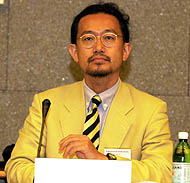 |
July.
Kazuaki Miyagishima, Associate Professor, School of Medicine,
Kyoto University, and moderator of the session, gave an overview
of the issues to be discussed, noting that human perception of,
and sensitivity to, factors affecting human health vary depending
on the type of risk factor. He said people are particularly concerned
about novel risks, while they are less sensitive to, inter alia,
hereditary, voluntary or pharmaceutical health risks.  Listen
to Miyagishima's introduction Listen
to Miyagishima's introduction |
Dominique
Taeymans, Director of Scientific and Regulatory Affairs, Confederation
des Industries Agro-Alimentaires de l'UE, spoke on the subject
of precaution. He noted it was first mentioned in the field of
environment, in the Rio Declaration, and questioned whether it
should be extended into other areas such as food safety. He said
the principle had been codified in the WTO SPS agreement that
requires food safety measures to be based on scientific evidence
and risk analysis, in accordance with Codex Alimentarius procedures
for risk assessment. Listen
to Taeymans' presentation Listen
to Taeymans' presentation |
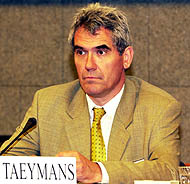 |
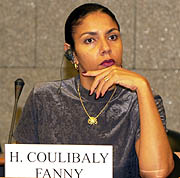 |
Hélène
Coulibaly Fanny, Director for Food and Quality, Côte d'Ivoire,
focused on developing country issues in terms of impacts of the
SPS agreement on both the public and private sectors and current
problem areas. She said the technical administrations had received
more information and training than the private sector but noted
that knowledge was insufficient and trade opportunities not emerging.
 Listen
to Coulibaly Fanny's presentation Listen
to Coulibaly Fanny's presentation |
Edward
Groth, Senior Scientist, Consumers Union, US, emphasized the multidimensionality
of the debate on GMOs, which covers scientific, human health-related,
ecological, and economic issues. On human health risks, he noted
possible allergenic or toxic effects, and cumulative impacts.
On ecological risk, he noted possible gene flow between populations
and gene pollution and difficulties to assess consequences. Listen
to Groth's presentation Listen
to Groth's presentation |
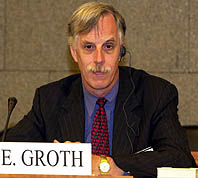 |
| TRIPS - Bio-technology & Bio-diversity | |
|
Thomas Cottier, Professor, Institute of European and International Economic Law, University of Berne, Switzerland, said that since the adoption of the TRIPs Agreement, the issues of biotechnology and biodiversity have been under discussion by a number of WTO departments. He questioned the extent to which the sharing of benefits can be promoted if all biological resources are in the public domain. |
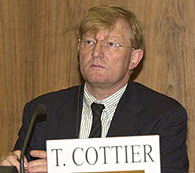 |
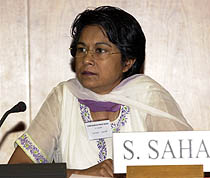 |
Suman Sahai, President, Gene Campaign, India, stated that genetic resources should remain in the public domain, and emphasized the importance of acknowledgement and economic gain from indigenous knowledge. Describing potential methods of protection for indigenous knowledge, she suggested certification and geographical indication. She said the greatest challenge would be to create sui generis systems with features such as prior informed consent and technology transfer. See RealAudio link above. |
Jeffrey
Kushan, Lawyer, Powell, Goldstein, Frazer and Murphy, the US,
explained the nature of biotechnology, particularly as it relates
to patenting and genetic resources. He distinguished between material
in its natural state, and that which has been made or modified
by human intervention. He discussed the CBD protection provisions,
and emphasized that the CBD provisions protect genetic resources
while the TRIPs agreement protects inventions.  Listen
to Kushan's presentation Listen
to Kushan's presentation |
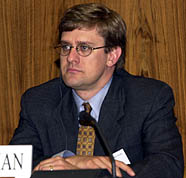 |
| Trade & Development | |
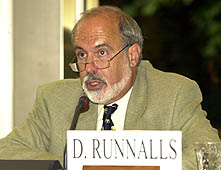 |
David
Runnalls, President, IISD, Canada, welcomed participants, and
pointed out that issues related to trade and development reflect
debates over implementation of the Uruguay Round. He identified
related issues regarding: the trade-offs between rates of growth
and income distribution; good governance and openness; real gains
for developing countries from the Uruguay Round; green protectionism
and market access; mainstreaming trade into development; and the
use of environmentally-friendly technologies.  Listen
to Runnall's introduction Listen
to Runnall's introduction |
Dilip
K. Das, Senior Economist, Asian Development Bank, The Philippines,
outlined the history of the relationship between trade and development
and related research, highlighting the long-standing but common
misconception regarding the benefits of trade. He said recent
research on the benefits of import substitution, as opposed to
export-led growth, has yielded results supporting both sides. Listen
to Das' presentation Listen
to Das' presentation |
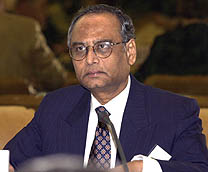 |
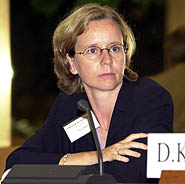 |
Penny
Fowler, Trade Policy Advisor, OXFAM, UK, stated that her organization
believes that trade can be a force for poverty reduction and development.
However, she explained that while rich countries and corporations
have disproportionately captured the benefits of trade, poor people
have suffered from trade liberalization when economic livelihoods
have been displaced by an influx of imports.  Listen
to Fowler's presentation Listen
to Fowler's presentation |
Jeffrey
Schott, Senior Fellow, Institute for International Economics,
the US, emphasized that trade does not determine development,
although trade can be a useful part of development policy. Pointing
to post-World War II development efforts, he stated that economic
development is in everyone's interest. However, he pointed out
that the state of globalization has made conditions different,
and problems are more serious. Regarding the ingredients necessary
to achieve development, he stressed the importance of self-reliance
and international support.  Listen
to Schott's presentation Listen
to Schott's presentation |
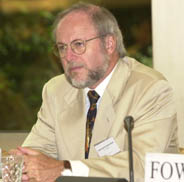 |
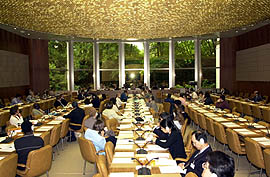 |
View from the back of room during the "Trade and Development" work session |
| Services - the status of public services and negotiating issues | |
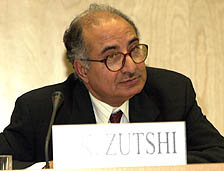 |
B.K.
Zutshi, former Indian Ambassador to the WTO, explained that public
services have not been defined per se in the GATS, and that the
concept is all-inclusive except for services provided in the exercise
of government authority. He questioned the effects of liberalization
on equity, cost, availability and efficiency, noting that net
impacts may depend on, inter alia, existing infrastructure.  Listen
to Zutshi's introduction Listen
to Zutshi's introduction |
André
Sapir, Professor, Université Libre de Bruxelles, Belgium,
emphasized the need for more efficient provision of services and
the sectoral dimension of the GATS negotiations. He questioned
whether negotiations on safeguard rules were encouraging or discouraging
liberalization, and said that whatever safeguard clauses may emerge,
they should be decided multilaterally and implemented without
discrimination.  Listen
to Sapir's presentation Listen
to Sapir's presentation |
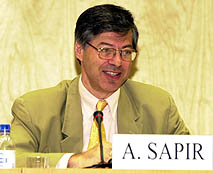 |
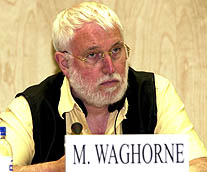 |
Mike
Waghorne, Assistant General Secretary, Public Services International,
France, stressed that most concerns about the GATS are not about
what it is or has done, but what it could do in the future. He
described concerns that have been voiced about the GATS, such
as that governments will be forced to liberalize public services.
He said that this is not necessarily the case, and outlined terms
within the agreement that provide protection to public services. Listen
to Waghorne's presentation Listen
to Waghorne's presentation |
 |
|
| WTO & Civil Society - WTO institutional reforms (continued) | |
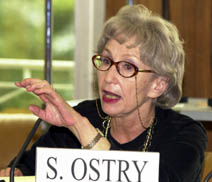 |
Sylvia Ostry, University of Toronto, noted that buffers no longer exist between international trade rules and the domestic policy space. She said there is no place within the WTO to have policy discussions, and called for the re-establishment of a forum also involving other entities than the WTO to create a necessary knowledge network. |
Sothi
Rachagan, Director, Consumers International, Regional Office for
Asia and the Pacific, stressed that the world trading system creates
comprises a framework for regulating trade, and should not be
a world governance body venturing into areas outside its competence.
He said the objective of the system is the raise standards of
living for all through the promotion of free trade, as stated
in the preamble of the WTO agreement, and stressed the objective
of more equitable distribution of wealth.  Listen
to Rachagan's presentation Listen
to Rachagan's presentation |
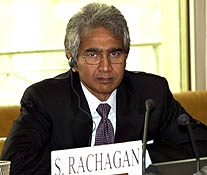
|
 |
Rachel
Thompson, Global Trade Practice, APCO, stressed that institutional
reform needs to be discussed at two levels - functional and institutional.
She noted competing visions on the role of the world trading system,
highlighting her view that it should be a vehicle for collective
prevention of the use of trade instruments for nationalistic purposes.
She called for more openness, including making documents more
accessible, and improving participation of countries without permanent
representation in Geneva.  Listen
to Thompson's presentation Listen
to Thompson's presentation |
| Pradeep Mehta, Secretary General, Consumer Unity & Trust Society, highlighted his experience as a Southern NGO, noting increased access to information and key players developing over the last several years. He noted the need for resources and opportunities in order to attract people to work in the sector, and difficulties due to having to focus on multiple issues. | 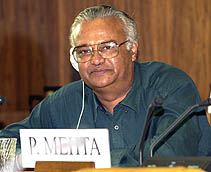 |